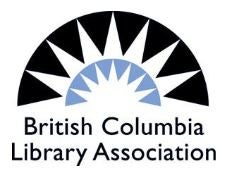 “The 2019 BC Library Conference theme is “The Future by Design”. The libraries and services we design help shape the future of our communities and our society. We invite the library community to explore the intentionality of our work and apply the tools of design thinking to our practice. “The Future by Design” imagines where our libraries might be headed and the paths we might take to get there. It encourages creative new ideas, prototyping, experimentation and testing. Help us examine forward-thinking ways to evolve our libraries as we continue to serve our communities and design our future.” — BCLA
“The 2019 BC Library Conference theme is “The Future by Design”. The libraries and services we design help shape the future of our communities and our society. We invite the library community to explore the intentionality of our work and apply the tools of design thinking to our practice. “The Future by Design” imagines where our libraries might be headed and the paths we might take to get there. It encourages creative new ideas, prototyping, experimentation and testing. Help us examine forward-thinking ways to evolve our libraries as we continue to serve our communities and design our future.” — BCLA
The conference began with an inspiring keynote by Vanessa Richards talking about the ‘Circle of Human Concern’; asking all of us to look around and really see ‘who is not at the table I sit at and what tables am I not sitting at’, encouraging us to not just think outside the box but to challenge ourselves and ask how we silence ourselves.
I also had the opportunity to attend many great sessions dealing with topics that impact a variety of areas – from how to build collaboration to what a library on wheels could look like.
The session on collaboration took the idea of collaboration, or the action of working with someone to produce or create something, and brought it back to what it looks like (and what it doesn’t look like) and how we can create spaces within our worksites that foster collaboration in a real and meaningful way. Collaboration doesn’t just happen; it asks us to step outside of our comfort zones and begin to be comfortable with the uncomfortable, to not be vested in our own ideas but to truly listen to those around us and accept that failing is not failure, but a step on the road to success.
Kari and I attended a session titled ‘How to Implement a Mental Health Program In Your Library’. The speaker showed how at their library system, Pickering Public Library, mental health support goes well beyond having an EFAP and is instead now woven into every aspect of their daily work life. Not only does it help with employees’ mental health, but the benefits of this approach were seen throughout various aspects of the organization, from a greater use of the EFAP to lower absenteeism, and it has helped to create a normalizing of addressing mental health on a daily basis, allowing people to be able to talk and not have to have ‘the talk about mental health’.
Read here for more information on Pickering Public Library’s approach.
Other interesting sessions I attended were Pedal Powered Community Outreach, and the use of bicycle libraries as outreach resources and promotional devices; Involving Library Technicians in the Future of the Profession; Accessible Library Service from the Bottom Up, or what it means to be a truly accessible service and how to think outside the box to become one’; and Beyond Fandoms: The Digital Ecology Behind Fanfiction and Why Libraries Need To Pay Attention.
But the big draw of the conference seemed to be the Hot Topic Plenary: Messy Moments: Libraries and Intellectual Freedom. While not talking about a specific incident (although it was acknowledged that the January event held at VPL did spur the necessity for the conversation) the panelists and audience where challenged to ask ourselves ‘who we are as library communities’ and ‘what are the limits of intellectual freedoms and where do we draw the line?’ And while a lot of questions were asked with no definitive answers given, it reminds us that these are questions that need to be continually addressed as society and the needs of our communities change; people are coming from different places and time needs to be given to reflect on this discussion.
CUPE 391 Delegate: Vice-President Tanya Ferry

